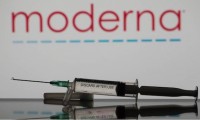-
AstraZeneca/Sanofi’s RSV antibody receives FDA approval for use in infants
- Source: drugdu
- 121
- July 22, 2023
-
WHO director-general calls out critics of planned pandemic accords
- Source: drugdu
- 110
- July 22, 2023
-
GSK-Funded Report on Adult Vaccination Rates Finds Major Global Declines in Recent Years
- Source: drugdu
- 207
- July 21, 2023
-
Pfizer Inks Potential $7B Deal with Flagship to Deepen Pipeline
- Source: drugdu
- 107
- July 20, 2023
-
DNA Origami Could Be Used to Create Customized Virus-Like Particles
- Source: drugdu
- 169
- July 19, 2023
-
GSK’s Jemperli Made Available to Endometrial Cancer Patients via UK’s Early Access Scheme
- Source: drugdu
- 118
- July 13, 2023
-
Moderna Mounts 2 New Patent Lawsuits Against mRNA Rivals Pfizer, BioNTech
- Source: drugdu
- 131
- July 13, 2023
-
UAE, Saudi Arabia Serve as Gateway to International Markets for Biopharma
- Source: drugdu
- 151
- July 13, 2023
-
Moderna strikes deal to develop mRNA drugs in China
- Source: drugdu
- 98
- July 8, 2023
-
MHRA reveals new corporate plan to expedite drug regulatory journeys in UK
- Source: drugdu
- 112
- July 7, 2023
your submission has already been received.
OK
Subscribe
Please enter a valid Email address!
Submit
The most relevant industry news & insight will be sent to you every two weeks.













